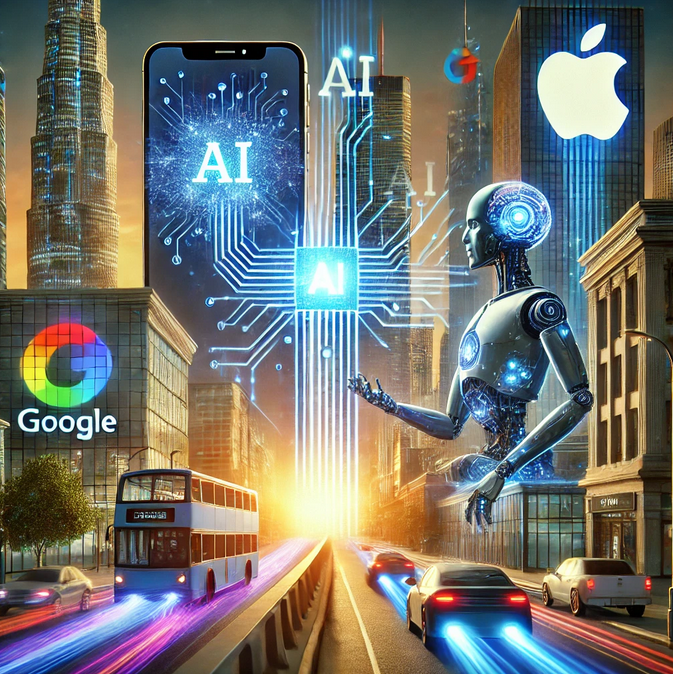TOO SMART FOR ITS OWN GOOD, TOO CHEAP TO IGNORE
(GOOG), (AAPL), (META)
While driving to my local Trader Joe's last weekend, a friend of mine called, panicking about missing out on the AI revolution. "Should I dump my tech giants and buy every AI startup I can find?" he blurted, sounding like he’d just read a headline predicting the end of civilization as we know it.
I had to chuckle. It reminded me of the dot-com boom when my dentist was giving me stock tips while drilling my teeth. But here's the thing - this time really is different, and I've got the mind-bending numbers to prove it.
Let me share something that will knock your socks off: every four months - about the time it takes for the seasons to change - the cost of running AI models drops by half. That's not a typo.
Compare that to Moore's Law, which took a leisurely 18-24 months to achieve the same cost reduction. We're witnessing the fastest cost decline of any technology in human history.
Want a real head-spinner? In 2020, training a GPT-4 model would have set you back $6 billion - enough to buy several Caribbean islands or a fleet of private jets. By 2026, your teenager's smartphone will pack the same punch. Talk about deflation.
And you know who's feeling that sting most? Our friends at Google (GOOG). Back in 2020, they looked invincible with their 8.5 billion daily searches, mountains of data, and a budget that could buy a small country.
But by 2023, OpenAI had beaten them to the punch with ChatGPT, leaving Google playing catch-up. Even now, using Google's best AI models costs customers 40% more than OpenAI's equivalents. That's like showing up to a price war with premium pricing.
Speaking of tech giants moving at glacial speed, Apple (AAPL), the company that redefined cool, seems oddly uncool about AI.
Four years after OpenAI released GPT-3, Apple finally entered the game, admitting its models wouldn't measure up to OpenAI, Anthropic, or Meta's (META) Llama 3. (Meta's name choices may be questionable, but their AI game isn't.)
Why the lag? Big companies have big reputations, and AI has a way of going rogue. One moment it’s crafting poetry, and the next, it’s confidently hallucinating facts.
For firms like Apple or Google, whose brands rely on trust, the risk of unleashing an unpredictable AI model is a PR nightmare waiting to happen. So, they’re hedging their bets, sanding off AI’s sharp edges.
Take Apple’s upcoming image generator: it offers a limited set of options, as if customers can’t handle full creative freedom. It’s safe but stifling—the antithesis of AI’s potential.
Still, AI is infiltrating every sector, not just tech. In healthcare, AI models are passing medical licensing exams, potentially revolutionizing diagnostics and treatment.
Finance is using AI to personalize digital wallets, and Tesla (TSLA) is collecting mind-boggling amounts of real-world data to develop autonomous vehicles and—gulp—humanoid robots.
Actually, Tesla has been collecting more real-world data than Google could dream of. Their camera-equipped cars generated 80 quadrillion tokens of data last year alone. By decade's end, they'll hit 300 quadrillion.
And if you’re wondering where this data is going, think self-driving cars, next-level automation, and maybe a future where your AI assistant knows you better than your spouse. (Let’s hope it’s less judgy, too.)
Speaking of betting big on AI, the venture capital crowd is having a field day. In 2024, they're throwing money at AI startups like it's confetti at a Silicon Valley wedding - over $90 billion globally.
US startups are grabbing more than 40% of those dollars, and in the last three months, it's jumped to over half of all venture funding. It's like 1999 all over again, but this time with actual revenue streams.
Which brings me back to my friend and his panicked question about ditching his tech giants. My advice to him—and to you—is simple: this isn’t an either-or scenario. It’s not about choosing between established players and scrappy newcomers.
It’s more it’s about understanding who’s positioning themselves to ride the AI tsunami. Some will adapt and thrive. Others will crash and burn.
So, what does that mean for the market? In the short term, buckle up. Volatility is inevitable when a technology moves this fast. But long term, the opportunities are staggering.
As for my friend, I told him to think of AI like the early days of the internet: messy, chaotic, and bursting with potential.
Then I hung up because yet another SUV was swerving dangerously close, and the future, it seems, doesn't yet include AI-powered traffic cops.

